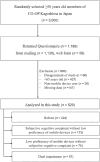Association of mobile device proficiency and subjective cognitive complaints with financial management ability among community-dwelling older adults: a population-based cross-sectional study
- PMID: 38367133
- PMCID: PMC10874308
- DOI: 10.1007/s40520-024-02697-8
Association of mobile device proficiency and subjective cognitive complaints with financial management ability among community-dwelling older adults: a population-based cross-sectional study
Abstract
Background: Mobile devices have been used by many older adults and have the potential to assist individuals with subjective cognitive complaints (SCCs) in daily living tasks. Financial management is one of the most complex daily activity for older adults, as it is easily impaired in the prodromal stage of dementia and cognitive impairment.
Aim: To investigate financial management ability among older adults from SCCs and mobile device proficiency.
Methods: A self-administered questionnaire was sent to 529 participants who were ≥ 65 years and regularly use mobile devices. Participants were divided into four groups based on SCC prevalence and scores of the Mobile Device Proficiency Questionnaire (MDPQ-16). Financial management abilities were compared between groups using the Process Analysis of Daily Activities for Dementia subscale. Regression model and crosstabulation table were used to investigate associations in detail.
Results: A significant difference in financial management ability was observed among the four groups (p < 0.001), with the dual impairment group showed significantly lower than the robust and SCC groups (p < 0.001). Educational history, sex, and MDPQ-16 score were significantly associated with participants' financial management ability (p ≤ 0.01). The proportion of participants who could use ATMs and electronic money independently was significantly lower among those with low proficiency in mobile devices (LPM), regardless of SCC (p < 0.05).
Conclusion: The LPM group showed an impaired ability to manage their finances, particularly in situations where they would use information devices. Therefore, healthcare professionals should assess not only the SCC but also their proficiency with mobile devices to predict their impairment in activities of daily living.
Keywords: Community; Cross-sectional study; Financial management; Mobile device; Subjective memory complaints.
© 2024. The Author(s).
Conflict of interest statement
The authors have no conflicts of interest to declare.
Figures


References
MeSH terms
LinkOut - more resources
Full Text Sources
Medical
Research Materials

